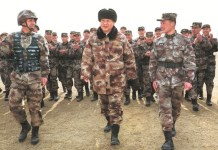UK’s British Petroleum report titled “Annual Energy Outlook 2019” highlights the uncertainties in global energy markets. The Energy Outlook report predicts India to excel in the world energy market by mid-2020s.
China And Russia Poses Threat To US Space Capabilities, Says Report
The British Petroleum’s Annual Energy Outlook 2019 explores the key uncertainties that could affect the shape of global energy markets out to 2040. The report states: “The greatest uncertainties over this period involve the need for more energy to support continued global economic growth and rising prosperity, together with the need for a more rapid transition to a lower-carbon future. These scenarios highlight the dual challenge that the world is facing”.
The report also brings to light the Global energy demand which is expected to increase by around a third by 2040, due to the rise in living standards, especially in India, China and across Asia. This will be met mostly by natural gas, which is expected to overtake coal as the second largest source of energy by the mid-2020s and oil by 2040.
India’s energy consumption will rise by 156 percent to 1,928 million tonnes of oil equivalent by 2040 from 754 million tonnes of oil equivalent in 2017. Much of the increase in global energy demand is concentrated in India, China, and Other Asia, where rising and improving living standards support energy needs.
“China’s transition to a more sustainable pattern of economic growth means that by the mid-2020s, India surpasses China as the world’s largest growth market, accounting for over a quarter of the growth in global energy demand over the Outlook. Even so, China remains the largest market for energy: roughly double the size of India in 2040,” the report said.
According to the Energy outlook report, “Coal consumption within industry declines as China, the EU, and North America switch to cleaner, lower-carbon fuels, partially offset by growth in India and Other Asia”.
More News at EurAsian Times
- Indian Military Base in Sabang can Strangle China at the Strait of Malacca
- Why is Japan Unhappy with Bullet Train Project in India?
- Is Saudi-UAE Alliance Working to Weaken the Gulf Cooperation Council?
- India-Japan Defence Partnership Aggressively Countering China
- Oman-UAE Relations Deteriorate; Muscat Warns Against Testing Patience




